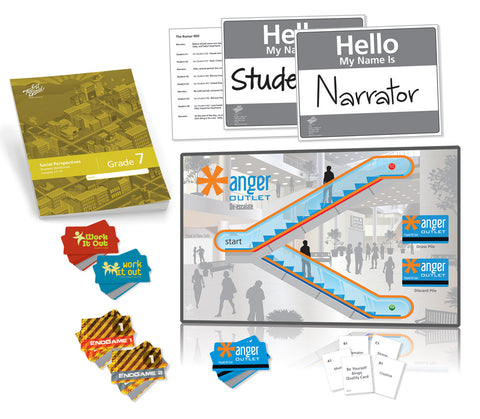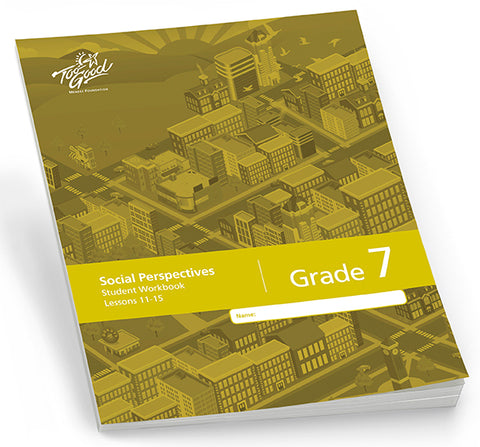The Too Good toolkit includes everything you need to teach the lessons:
- Teacher's Manual
- 30 Student Workbooks
- Goal Setting Model Poster
- Decision Making Model Poster
- Alcohol is Alcohol Poster
- Al K. Hol Poster
- Al K. Hol Accessories
- Communication Banner and Communication Role Accessories
- Role Play Script Set
- Peer Refusal Strategy Cards
- Healthy, Alcohol, and Marijuana Brain Scan Display Cards
- Goal for It Game
- Toxic Concentration Game
- Drone Zone Game
- Goal Get 'em! Game
- Game Pieces w/ Die
Curriculum Features include:
- Ten 50-minute fully scripted, research-based lessons conveniently presented in a tabbed three-ring binder, making them easy to use and enjoyable to teach.
- Comprehensive planner for each lesson with clearly-stated, measurable objectives, topic rationale, and allotted activity times.
- Parent component, “Home Workout: Exercises for Adults and Kids,” to extend prevention skills and messages into the home.
- Looking for More? Each lesson includes cross-curricular lesson extenders with suggestions for infusion, recommended reading, and additional activities for reinforcing important concepts and skills.
- Assessment materials to measure student outcomes and process outcomes including implementation effectiveness and fidelity of implementation as well as student knowledge, attitudes, and behavior.
- Pre-delivery subject matter content review and lesson delivery guides to prepare instructors for more complex lesson topics
- Too Good for Drugs logic model including the program’s theory of change and the proven strategies incorporated into the lessons.
- Strategies and methods to build family and school connections to reinforce the healthy social and emotional development of the students.
How does Too Good work?
Too Good offers separate, developmentally appropriate curricula for each grade level in grades six through eight. Each grade level builds on the previous by continually developing skills and addressing common issues faced in middle school life, teaching students how to manage situations in a positive and healthy way.
Mitigates risk factors and builds protective factors
Too Good uses skill development to mitigate the risks associated with problem behaviors including:
- Poor Social Skills
- Peer Rejection
- Inappropriate Social Behaviors
- Favorable Attitudes Toward Drug Use
- Low Perception of Harm
- Friends Who Engage In Problem Behaviors
Too Good builds protection within the student by:
- Providing Opportunities for Pro-Social Involvement
- Establishing No-Use Norms
- Promoting Bonding to Pro-Social Peers
- Increasing Personal and Interpersonal Skills Associated with Positive Behaviors and Student Success
Understanding the Logic Model
The Mendez Foundation developed Logic Models for Too Good to map out the Theory of Change and demonstrate graphically the assumptions that drive the learning and behavior change in Too Good. The logic model communicates an "if-then" message of what changes the program intends to produce. It helps to make the connections among the target group, goals, strategies, objectives and planned program results and lays out what the program is expected to achieve and how it is expected to work.
Research Design
Each of the Too Good evaluation studies were conducted by third-party researchers and used randomized treatment-control group designs (pre-test/post-test, 20-week post-test, or one-year follow-up). The Researchers examined pre-test equivalence between treatment and control groups; potential bias of loss of student data over time; quality of program implementation; and estimates of reliability and validity of assessment tools.
The award-winning Too Good programs have undergone rigorous, independent evaluation studies to measure their effects on students' skills, attitudes, intentions, and behaviors. Studies have been published in peer-reviewed journals and presented at national evaluation conferences. These studies demonstrate the effectiveness of Too Good.
Research Reports
2000 Summary 2000 Full Report 2001 Summary 2001 Full Report 2003 Summary 2003 Full Report
| Organization/Agency | TGFD K-8 | TGFV K-8 | TGFD&V High School |
|---|---|---|---|
| What Works Clearinghouse: U.S. Department of Education, Institute of Education Science | Positive effects on behavior View Report | Positive effect on behavior & knowledge, attitudes & values View Report | Positive effect on behavior & knowledge, attitudes & values View Report |
| CASEL: Collaborative for Academic, Social, and Emotional Learning | Not Yet Rated | Elementary SELect Program View Report | Not Yet Rated |
| NREPP: National Registry of Evidence-Based Programs & Practices | Reviewed evaluation View Report | Reviewed evaluation View Report | Reviewed evaluation View Report |
| CEBC: California Evidence Based Clearinghouse for Child Welfare | TGFD Grade 6 Scientific Rating 2 - Supported by Evidence View Report | Not Yet Rated | Not Yet Rated |
| OJJDP: Office of Juvenile Justice & Delinquency Prevention | Promising program View Report | Exemplary program View Report | Exemplary program View Report |
| Promising Practices Network: Programs that Work | Screened program View Report | Screened program View Report | Screened program View Report |
| SAMHSA: Substance Abuse & Mental Health Services Administration | Model program | Model program | Model program |
Awards
Too Good programs have earned recognition and acclaim for their impact in promoting safer and healthy youth and communities.
- Florida Alcohol and Drug Abuse Association's (FADAA) Best Practices Award
- The American Medical Association's National Congress on Adolescent Health
- The President's Child Safety Partnership
- Southeast Regional Center for Drug-Free Schools and Communities Shining Star Award
- Our programs received a high rating in "Drug Strategies"
Other Recognition
Recognition for Too Good for Drugs™ in Drug Strategies "Making the Grade": "Some very strong elements in this very detailed, 10 session per year curriculum. Provides developmentally appropriate information about alcohol, tobacco and marijuana. Normative education activities creative and compelling, new ideas for games. Includes no-use pledge."
Recognition for Too Good for Violence in Drug Strategies "Safe Schools, Safe Students": "A delightful package of materials (that) complements this highly interactive 4-9 session program. Strongly focused on critical skill areas. Extremely detailed instructions for teachers. Very complete."




